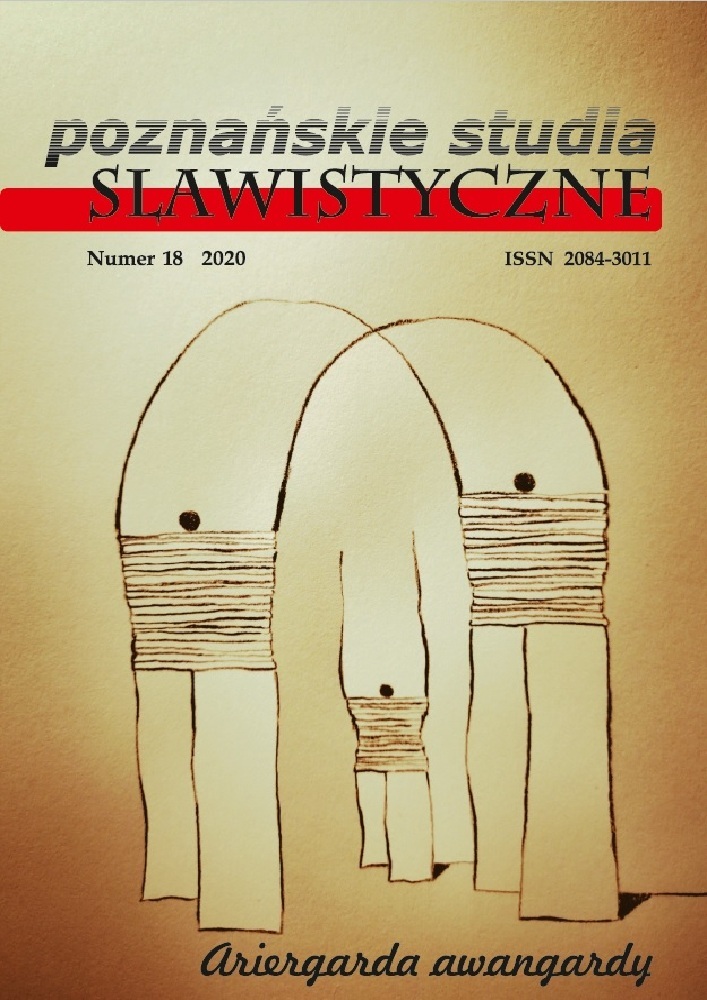Abstract
The article addresses the presence of the avant-garde in the discourse and the practice of social resistance in Serbia at the turn of the 20th and 21st centuries. The focal point of the text is the thesis that nowadays the avant-garde resonates not so much as an artistic formation, but as an ideological complex. The author investigates the manners of contemporary transposition of ideas and avant- garde imagination through the analysis of the activities of the Centre for Cultural Decontamination in Belgrade. Using the examples of two programmes: Modernism, Serbian National Identity in 20th Century and En Garde – Avant-Garde 20/21, the author shows how the local experience of the interwar avant-garde and the neo-avant-garde formed within the movement of ʼ68 protests, creates a specific ideological current, a model of self-organization and a pattern of activities bordering between art and socio-political reality. In the 1990s, in Serbia, it becomes the reference system for artivism (an approach consisting in influencing social and political reality through art), and today still remains an inspiration for independent intellectual and artistic environments and for critical institutions that create an alternative and polemic cultural space to the official policies of the Serbian authorities.
References
Bal, M. (1999). Quoting Caravaggio: Contemporary Art., Preposterous History. Chicago–London: University of Chicago Press.
Bauman, Z. (1994). Ponowoczesność, czyli o niemożliwości awangardy. „Teksty Drugie” nr 5/6 (29/30), s. 171–179.
Boym, S. (2015). Anioł historii. Nostalgia i nowoczesność. Przeł. K. Rychter. „Kronos” nr 3 (34): Budowa nowoczesności, s. 190–202.
Čolović, I. (2002). Druga Srbija. „Pešćanik” 30.11.2002. https://pescanik.net/druga-srbija/, 1.09.2019.
Czapik-Lityńska, B. (1996). „Jeszcze nie”. Utopicum jugosłowiańskiej awangardy. Katowice: Wydawnictwo Uniwersytetu Śląskiego.
Dragićević Šešić, M. (2018). Umetnost i kultura otpora. Beograd: Institut za pozorište, film, radio i televiziju Fakulteta dramskih umetnosti–Clio.
Dimitrijević, B. (ur.) (2016). En Garde 20/21. Beograd: Heinrich Böll Stiftung–Centar za kulturnu dekontaminaciju.
Foster, H. (2012). Powrót realnego. Awangarda u schyłku XX wieku. Przeł. M. Borowski, M. Sugiera. Kraków: Universitas.
Groys, B. (2015). Poza różnorodnością: kulturoznawstwo i jego postkomunistyczny inny. Przeł. R. Kuczyński. „Kronos” nr 3 (34): Budowa nowoczesności, s. 159–170.
Jakšić, B. (2012). Praxis – mišljenje kao diverzija. Beograd: Službeni glasnik.
Konstantinović, R. (2004). Filosofija palanke. Beograd: Otkrovenje.
Miljanić, A. (red.) (2001). Antifašizam. Okrugli sto, Muzej „25 Maj”, 25.09.2001 [zapis debaty]. „Glasilo projekta «Moderna, srpski nacionalni identitet u XX veku»” br. 5.
Milohnić, A. (2013). Koreografije otpora. „Teorija koja hoda. Impresumˮ br. 21: Društvena koreografija, s. 15–20.
Naumović, S. (2009). Upotreba tradicije u političkom i javnom životu Srbije na kraju dvadesetog i početkom dvadeset prvog veka. Beograd: Institut za filozofiju i društvenu teoriju–Filip Višnjić.
Pavićević, B. (2012). Magiczna ściereczka [wywiad przeprowadzony przez J. Wichowską]. http://www.dwutygodnik.com/artykul/3867-magiczna-sciereczka.html, nr 89. 1.09.2019.
Samardžić, M., Bešlin, M. (2015). Nova čitanja Dimitrija Tucovića 100 godina posle: zbornik radova. Novi Sad: Alternativna kulturna organizacija AKO.
Sretenović, D. (2016). Urnebesni kliker. Umetnost i politika beogradskog nadrealizma. Beograd: Službeni glasnik.
Stojković, D. (2011). Antiratne i mirovne ideje u istoriji Srbije i antiratni pokreti do 2000. godine. „Republika” br. 429–493. http://www.republika.co.rs/492-493/20. html. 1.09.2019.
Szwat-Gyłybowa, G. (2018). Kilka uwag o sile i bezsilności badaczy idei wędrownych. W: Leksykon idei wędrownych na słowiańskich Bałkanach XVIII–XXI wiek, t. 1: Oświecenie – religia – racjonalizm. Warszawa: Instytut Slawistyki Polskiej Akademii Nauk, s. 7–16.
Šušak, B. (1996). Alternativa ratu. W: Srpska strana rata. Trauma i katarza u istorijskom pamćenju. Ur. N. Popov. Zrenjanin: Republika, s. 531–545.
[Šuvaković, M. (2006). Farenhajt 387. Teorijske ispovesti. Novi Sad: Orfeus].
License
Copyright (c) 2020 Magdalena Bogusławska

This work is licensed under a Creative Commons Attribution-NoDerivatives 4.0 International License.

